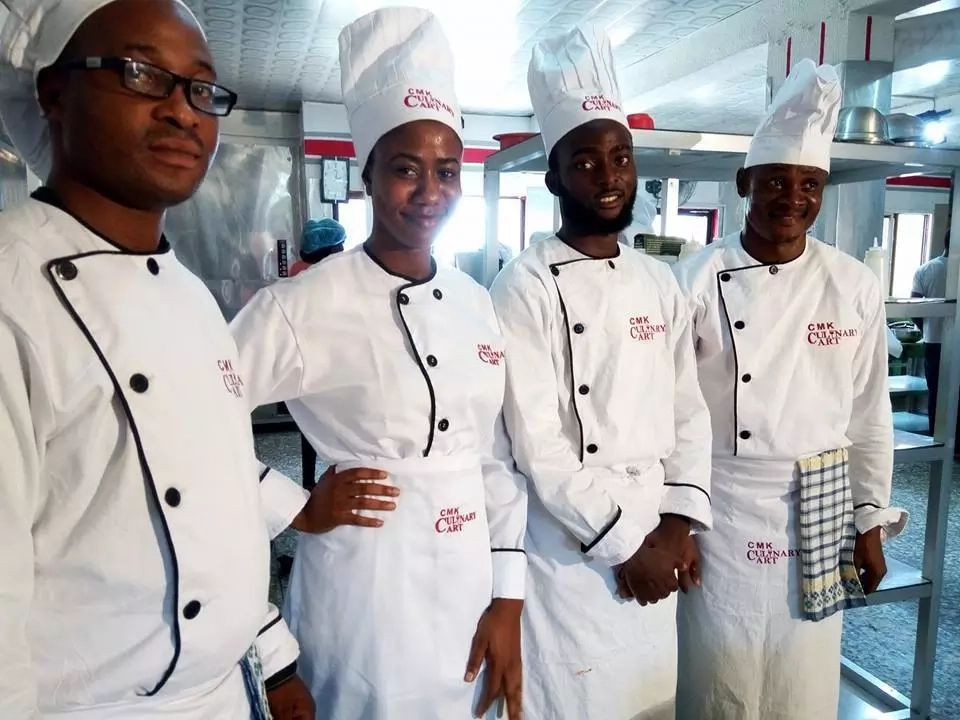If you enjoy cooking and you are very good at it, then this piece is for you. Have you ever thought about going professional?
You know like working for a five-star hotel or a restaurants or even starting your own cuisine business. Do you know what it takes to be a professional chef in Nigeria?
Do you even know that it is lucrative? People like Jamie Oliver and Iyabo Lawani have proved that being a professional chef anywhere in the world pays a whole lot. However, it demands passion, diligence, focus, skill, art and more. Virginia Woolf once said:
“One cannot think well, live well and sleep well, if one has not dined well.”

That statement is a huge pointer to the importance of chefs in the life of man. A chef is a highly trained and skilled professional cook who is proficient in all aspects of food preparation.
Chefs work in restaurants, hotels and such other places where cooked food are sold and served. In Nigeria, we have so many professional chefs, some of whom will be mentioned in the course of this piece. So you want to become a professional chef, abi? Read on!
Passion
This cannot be overstated. In fact, passion is the driving force to succeed in any endeavour in life. Such passion usually develops early and it must be nurtured.
The passion to cook is what would make a boy-child stick with his mum in the kitchen and learn the art of cooking. This passion may also become evident as one grows.
Whichever way it comes, passion must be genuine because no one can go on doing something they don’t enjoy every day.
Abiola Akanji aka Chef Stone, founder of Red Dish Chronicles Culinary School calls food his passion and on his page, he reveals that the passion started at a tender age as he was always in the kitchen with his mum.
Cleanliness and good personal hygiene
Research shows that the kitchen is the place where germs are most likely to be found. This is because germs thrive on food especially leftovers and spoilt food and we all know how quickly germs can spread, contaminate food and cause infection to people.
This is why a chef must strictly maintain a high standard of hygiene. Best practices include keeping oneself clean and tidy, washing hands thoroughly before handling food, tidying up the kitchen even as one is cooking and so on.
Cook at home often
This helps you cook at your own pace unlike cooking as a chef where you have to be time-conscious. Also, you get to understand what type of cuisine you handle best – is it pastry or soups or what? – and it gives you an area to specialize in when it’s time to go pro.
Another benefit of cooking at home often is that you become deft with cooking utensils like them knife and others. Take your time to serve people what you have cooked and get their opinions; it’s part of the art of culinary as the popular Chef Fregz once mentioned that during his University days, he often spent his savings to cook for family and friends; and he forced them to try his food out and say something about it.
Take a job or internship at a restaurant or eatery
You get the exposure you need in the field you are venturing into; firsthand experience and learning new and better cooking techniques different from those you use for your home meals.
This also boosts your resume. Mention must be made here of Chef Shuby who became part of the Red Dish Chronicles Culinary School after an eventful internship.
Enrol for a culinary art program
This is not compulsory especially for those who intend to get self-employed, start their own restaurant and be their own boss.
For instance, Aaron Bolarinwa, owner of Avant-garde Cuisines in Lagos is a self-taught chef with no formal training. However for those who plan to get employed in top hotels and restaurants, certification from a reputable culinary academy is needed as it would give an edge in the hiring process. There are a handful of such academy scattered around states in Nigeria.
Having acquired the experience, knowledge, skills and certification, the time to apply for chef job ripens.
When the choice job comes, much is usually expected and a budding chef cannot afford to mess up; you don’t want to lose customers and clients.
The pressure is much but professionalism is the key to prosperity. Studies show that people tend not to talk about the good food they eat but when the food is bad, the tendency that they will rant to someone is pretty high.
It is also pertinent at this point to mention that as an employee chef, you have to start from the bottom and work your way up to the highest position of an executive chef who coordinates the whole kitchen, oversees junior chefs and kitchen staff and prepares menu items himself. The executive chef is also called a master chef or a head chef.
There is also the Sous chef who is second in command to the executive chef and mainly substitutes when the executive chef is off-duty.
The Sous chef also is in charge of cleanliness, organization of staff and keeping inventory. Others include the Station chef who handles a particular type of food for instance, there are station chefs for all types of soup, for pastry, for fries etc. Then there is the Range chef who assists the Station chef. Range chefs are usually the rookies.
One thing about professionals in any field is their dynamism, creativity and adaptability. As a professional chef, you have to be abreast of the latest food trends and your skills must be ever developing until perfection is attained. The gist is that you cannot be obsolete; the restaurant has to thrive.
A university education is not needed. However, it may be a plus. Just love to cook, learn to cook, learn new techniques and show what you’ve got to the world!






